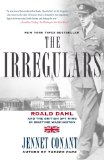Summary | Excerpt | Reviews | Beyond the Book | Readalikes | Genres & Themes | Author Bio

Roald Dahl and the British Spy Ring in Wartime Washington
by Jennet Conant
There was something about this remote, ascetic-looking man, with his withered left arm and disdainful air, that brought out the devil in Dahl. The embassy, like most British expatriate institutions, resembled nothing so much as a proper British public school and no doubt evoked unpleasant memories of the many years he had spent in those institutions and the succession of headmasters who had condoned unconscionable beatings of their young charges in the name of discipline. Dahl was not alone in feeling like he was back in school. Isaiah Berlin, who after Pearl Harbor had been seconded from the Ministry of Information to the embassy in Washington, compared the ambassador to a kind of Provost, "very grand, very vice-regal," who looked down on the junior embassy officials, to say nothing of young attachés from the various missions.
It was common knowledge that Halifax, formerly foreign secretary, had expected that he and not Churchill would succeed Neville Chamberlain as prime minister and that Churchill had sent him to America to get him out of the way. It was equally well known that as one of Chamberlain's key advisers, Halifax had advocated the doomed policy of appeasement toward the Germans and never lifted a finger to bolster Britain's defenses despite the growing threat. Moreover, Halifax was proving a liability with the Americans, who found the former viceroy of India to be the embodiment of every abominable cliché about the British aristocracy and compared him unfavorably to his predecessor, Lord Lothian, whose death in December 1940 was considered a great loss by both countries. Only three months after assuming his post, Halifax, true to form, had managed to commit a huge diplomatic blunder by going fox hunting in the green pastures of Pennsylvania. The sight of the new British ambassador riding to the hounds with American landed gentry prompted the poet Carl Sandburg to savage him in The Nation, ridiculing any official representative who would go cavorting around the countryside, indulging in "conspicuous leisure," while his countrymen "were fighting a desperate war with an incalculable adversary." He noted that photographs of His Lordship on horseback did nothing for the war effort and only inspired American workingmen to ask, "Are we going to war again for the sake of a lot of English fox-hunters?" Halifax continued to come in for steady criticism from the press, and even Churchill, on his visits to Washington, had taken to excluding him from his conferences with Roosevelt.
Dahl considered Halifax a pompous fool, completely dull and devoid of humor, and took every opportunity to ridicule his obsession with blood, class, and title. Like a goodly portion of the embassy staff, the British ambassador seemed to live in the past and soldiered on in the vague hope that the future would be much the same. A wicked mimic, Dahl could not resist mocking him. He took to imitating Halifax's old-empire style, embellishing his letters with the ambassador's obsequious phrases and endowing all his American friends with exalted titles. Marsh readily joined in the fun and sent his droll replies by return mail to Dahl's embassy office, which was not without risk. His note thanking Dahl for a box of cigars, courtesy of the diplomatic bag from Havana, was addressed, "For Transmission to the King":
Your most impressive gift will be consumed in the usual way. It is only human that I add that the element of snobbery which is present in all of us will be exhaled with every puff. You will pardon my Anglophobia.Marsh signed the letter, "Your Obedient Servant, Charles the Bald," and included a lewd postscript: "You, of course, were courteous to the queen [Alice], but haven't you found out over there that there are many better places to take one's trousers off than the marital bed?"
One cigar per Sunday will be my prayer and ritual to the Union Jack.
Copyright © 2008 by Jennet Conant
Not doing more than the average is what keeps the average down.
Click Here to find out who said this, as well as discovering other famous literary quotes!
Your guide toexceptional books
BookBrowse seeks out and recommends the best in contemporary fiction and nonfiction—books that not only engage and entertain but also deepen our understanding of ourselves and the world around us.